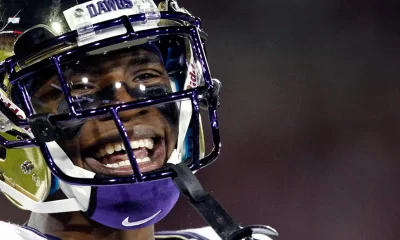When Kalen DeBoer shockingly departed the University of Washington to be Nick Saban’s successor at the University of Alabama, it came as a gut punch to the players who sacrificed so much to be a part of that locker room.
A locker room that was built on the foundation of loyalty and culture was ripped apart, and the aftermath was chaos.
In a flurry, multiple players immediately entered the transfer portal, with many uncertain of the future at Washington. Many of the top incoming transfers re-entered the portal, betrayed by the actions of DeBoer after buying into everything he had to say. For many fans, it felt like our program was left for dead, and DeBoer was the one to blame.
Ultimately, regardless of how you may feel about DeBoer’s sudden departure, there is a bigger issue at play that goes beyond any one individual. This is the fault of the broken system that has existed in the NCAA for years.
As betrayed as our fanbase may feel, Washington is not innocent in this ordeal either. When DeBoer was hired in 2021, he was poached from Fresno State after only two seasons with the team which left the players and fans feeling betrayed. After hiring Jedd Fisch over the weekend, Arizona players and fans felt the same heartbreak that their program may be falling apart.
I remember seeing this tweet about UW with DeBoer and felt absolutely gutted. I feel for the Zona program and the players. https://t.co/SpmZhouCTN
— ALL THEY SAW WAS ☔️ 🐟 (@patsking17) January 14, 2024
The NCAA is a broken system that prioritizes brand and money over the success of student-athletes. Coaches are able to jump ship in the middle of their contract with no backup plan in place, which is effectively destroying an entire culture for any program. Until there is a new system set in place, this is the new norm that will continue to take place for years to come.
So what can the NCAA do to prevent this from occurring? Obviously, there is no simple answer, but it is becoming more and more apparent that coaches are willing to use schools as stepping stones in order to get to the next level. It’s hard to blame players for constantly entering the transfer portal when the coaches who recruited them aren’t even willing to stay.
High buyouts don’t appear to be the answer, as $12.5 million wasn’t enough to convince DeBoer to stay. So maybe the NCAA needs to implement new rules that force a coach to ensure a program is in a stable position before they depart. Here are some potential solutions that could help prevent the destruction of a program any time a coach leaves in the middle of his contract.
1 – Players are not allowed to transfer to the same school as the coach.
Imagine if Michael Penix Jr. had another year of eligibility, and DeBoer decided that he would bring Penix with him while taking the Alabama job. The turmoil in the locker room would be overwhelming and the fanbase would be livid. Unfortunately, the reality is that this is the case around the country. After all, there is a good possibility that Fisch may bring some of his former players at Arizona with him to Washington.
Arizona running back Jonah Coleman is entering the transfer portal.
He is very likely headed to Washington.
— Jason Scheer (@jasonscheer) January 15, 2024
Making players ineligible to transfer to the same program as their former coach may convince some (not all) coaches to stay put at their current program if they can’t bring their players. This wouldn’t ultimately fix the system, but it can prevent a coach from absolutely gutting their former program while strengthening their new one.
2 – Players can’t enter the transfer portal for 72 hours after a head coach departs
If we learned anything from Alabama, Washington, and even Arizona, is that everything becomes absolute chaos as soon as the head coach departs. Multiple players immediately jumped into the portal without providing the program any opportunity to announce its successor. Although players are allowed to take their name out of the portal, more often or not you will see them transfer out.
More SuperWest CFB Portal Entrants
Washington 4⭐️ OL
Washington 4⭐️ QB
Washington 3⭐️ CB
Washington 4⭐️ WRTransfer Portal Tracker ⤵️https://t.co/DVJBaydwjl
— SuperWest Sports (@SuperWestSports) January 15, 2024
By adding a 72-hour window where players have to sit tight, you allow the university to find its new head coach, and empower that coach to convince the players to stay and buy back into the program. If players still decide to transfer afterward, then that is their decision to make.
3 – Buyout fees for coaches substantially increase for each additional year remaining on a contract
Signing an eight-year contract and leaving after year two should be nearly impossible to do unless fired by the university. Buyouts typically favor coaches to ensure that they receive a guaranteed amount of money if released, but the programs should be rewarded much more if a coach leaves early.
There should be an initial guaranteed buyout for each coach that allows them to make a protected amount of money if fired. But when that coach willingly signs a multi-year deal and leaves early, there should be more elements that will help protect the program that is being left to dry. There could be multiple ways of doing this, one being that there is up to a 10% increase from the initial buyout for every additional year remaining on the contract. This way a university has more leeway when offering a large contract extension.
Hugh Millen just said on KJR that the buyout for Fisch is $20,000,000. Is that enough to keep him here if Florida or the NFL comes knocking?
I think the NFL generally isn't in the business of buying out coaches for 8 figures to then turn around and pay them another $7 mil/year.
— Joe (@LocustAutoX) January 15, 2024
Programs should not be completely left in the dust when a successful coach leaves for a new school, there needs to be more done to ensure that the program is in a stable position for student-athletes to thrive. By taking that away, then what is the point of college athletics anyway?
There is a broken system in the NCAA and until there is a solution that prevents coaching from being poached by other universities, then the programs and the student-athletes suffer. It won’t happen this year, but the impact on schools this season from coaches who jumped ship early should be enough to show NCAA officials that something needs to change.











